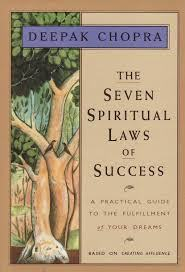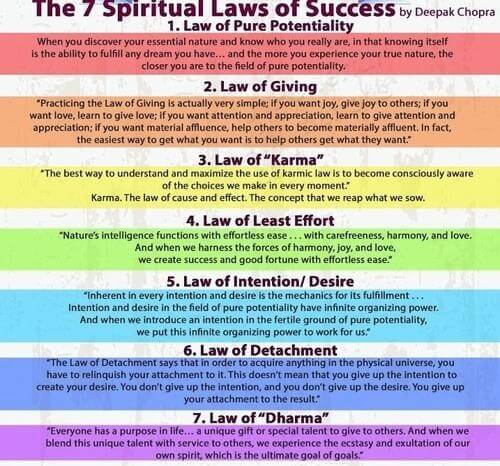Deepak Chopra‘s book, “The Seven Spiritual Laws of Success,” has been such a touchstone for me that I’m writing about each of the seven laws. This post brings the series to a close.

Deepak Chopra raised his children with the instruction that he didn’t want them to worry about making a living, but instead to focus on their life’s purpose.
Chopra told his kids they should find their dharma. They needed to figure out the reason they’re here and find a way to serve humanity with their unique talents.
In the final chapter of Seven Spiritual Laws, Chopra says the irony is that by telling his children not to worry about money, that they ended up going to good schools, getting good grades and making good money.
“They are focused on what they are here to give,” he explains.
My heart wants to believe this. My practical, linear type-A brain struggles. Money anxiety rises up and says, that’s well and good if you have a famous father who is willing to finance you, but the rest of us with bills, we need to consider the realities of work.
If your unique talent is something our society doesn’t value enough to pay a living wage, what then? We know plenty of people hustling to pay rent as writers, musicians, actors, artists.
This got me thinking about Joseph Campbell, perhaps best known for his advice to follow your bliss. I spent a lot of time pondering Campbell’s teachings during a midlife crisis at 40.
I don’t think follow your bliss or the law of dharma require that you pursue your passion full time, if that’s not going to pay your rent yet. But you do need to follow it. It can be a hobby, a side hustle, a component of your job, however you can make it work.
I love hosting people and connecting people. It gives me joy. But I don’t want to be a professional party planner and organize other people’s events. My joy comes in creating the vision on my own terms.
So I host parties as a hobby, not as my job, and it feels like following my bliss.
Chopra suggests asking yourself two questions:
- If money was of no concern, what would I do?
- How am I best suited to serve humanity?
 “You have a unique talent and a unique way of expressing it. There is something that you can do better than anyone else in the whole world,” he says. If you match that unique talent with the needs of others, you can unlock abundance because people will happily pay you for doing something no one else can.
“You have a unique talent and a unique way of expressing it. There is something that you can do better than anyone else in the whole world,” he says. If you match that unique talent with the needs of others, you can unlock abundance because people will happily pay you for doing something no one else can.
As a marketer, that sounds a lot like the business concept of a unique value proposition. That’s what makes a customer choose one business instead of another.
Chopra suggests linking something you do well with a need other people have — it’s not just something you like doing, but that you’re solving a problem for others with your unique talents. If they have a problem you’re uniquely qualified to solve, then maybe this is practical advice.
Chopra says that when you are doing what you are better at than anyone else, you lose track of time. So when you’re pursuing your passion, you’re probably working long and hard at it because it brings you joy. That probably also helps create abundance.
How to put the law of dharma into practice:
- Spend time in silence every day to get in touch with your higher, spiritual self. This ties back to law of pure potentiality, the first of the seven laws. Set aside 30 minutes in the morning and 30 minutes in the evening. “I need not do anything. I will just listen and the world will freely offer itself to me.”
- Make a list of your unique talents and list three things you love to do while expressing those talents. When you express your unique talents in the service of humanity, you lose track of time and create abundance.
- Ask myself daily, “How can I serve?” and “How can I help?” The answers to these questions will allow you to help and serve your fellow human beings with love.
Past posts in this series:
- The Seven Spiritual Laws of Success: #1, the law of pure potentiality
- The Seven Spiritual Laws of Success: #2, the law of giving
- The Seven Spiritual Laws of Success: #3, The law of karma
- The Seven Spiritual Laws of Success: #4, The law of least effort
- The Seven Spiritual Laws of Success: #5, The law of intention and desire
- The Seven Spiritual Laws of Success: #6, The law of detachment
Related blog posts:
- Vic Strecher studies what gives life purpose after he loses his own
- People with a sense of purpose live longer, according to research
- Good advice to help you find your life’s purpose
- Why Your Life Purpose Hurts Sometimes – a guest post from Christine Kane
- Should you really do what you love?
- Following your bliss, taking a hero’s journey — inspired by Finding Joe
- Are you feeling uninspired going to work today? How can you change that?

2 Comments
Leave a reply